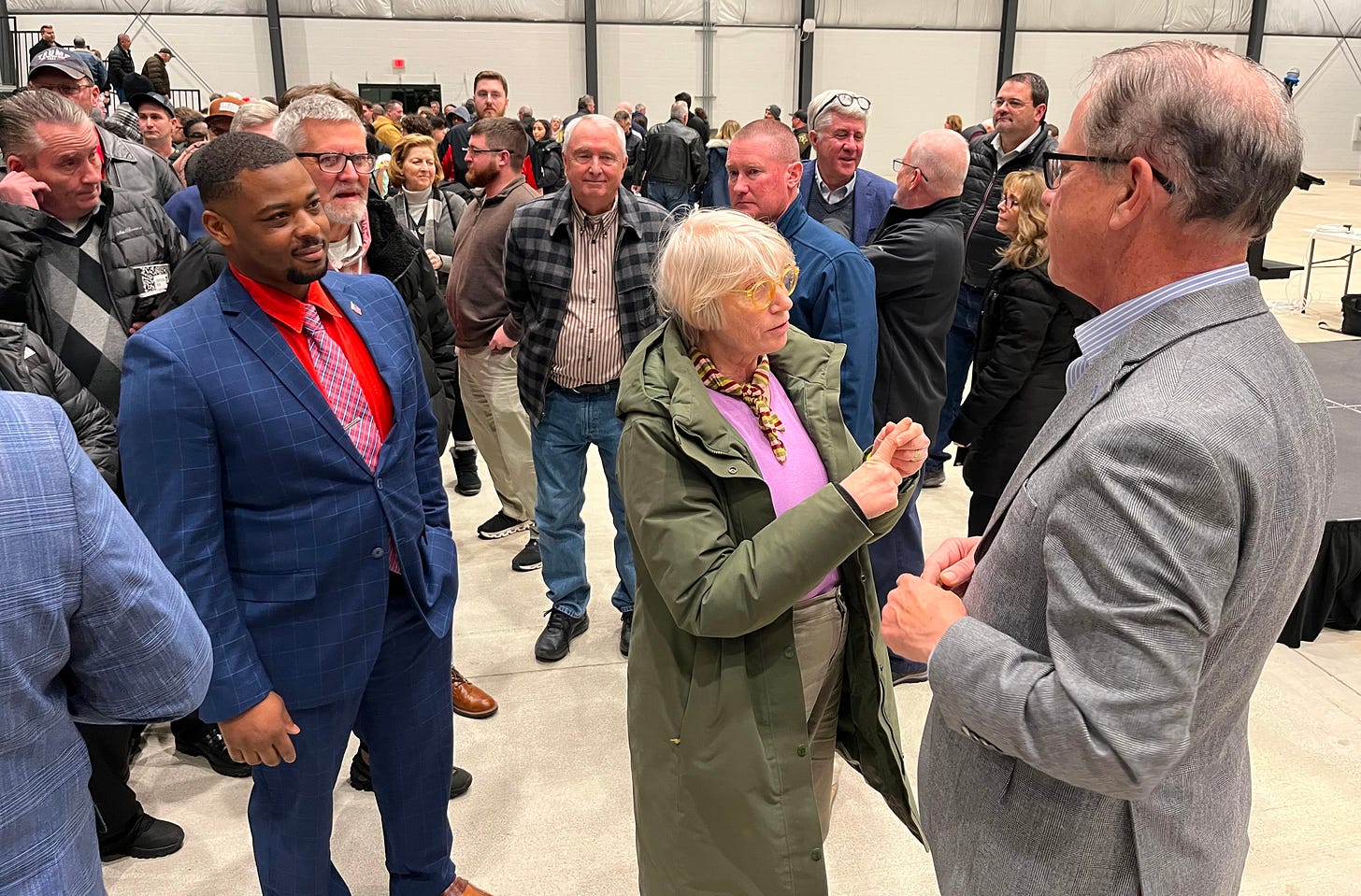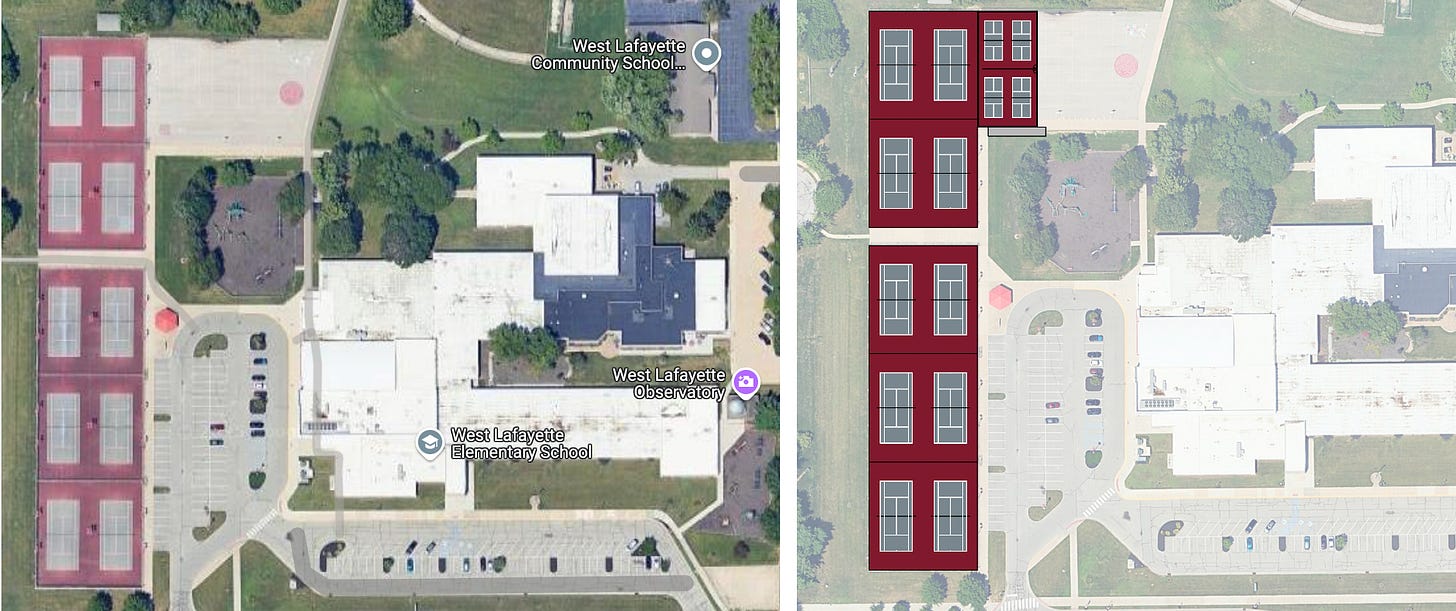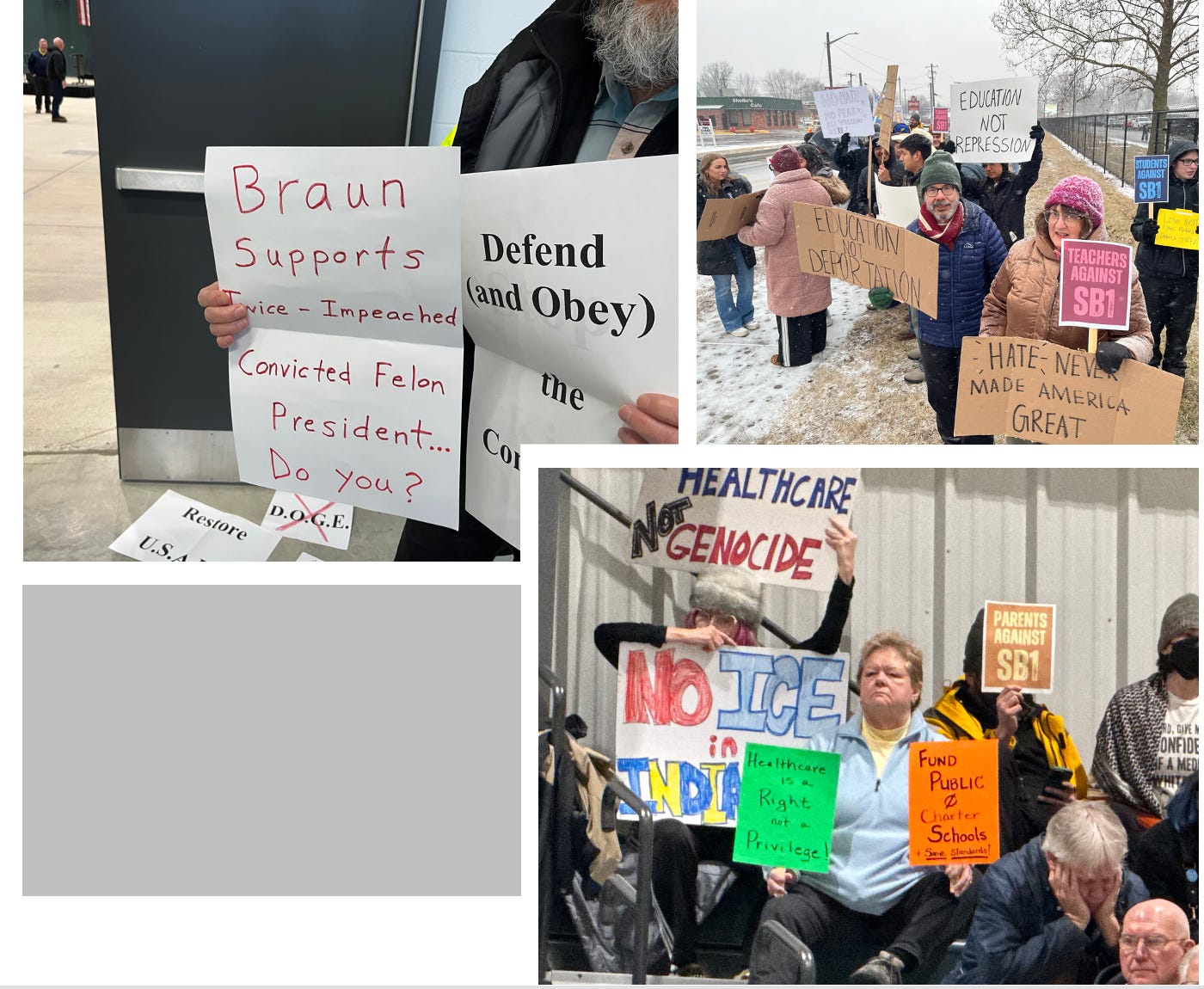Braun greeted by protest at Lafayette town hall, meets each individually afterward
Things get testy as governor came to fairgrounds Wednesday. Plus, updated local numbers on SB1’s property tax impact. West Side picks tennis court plans. Adriana Harmeyer’s ‘Jeopardy’ run still alive
Support for today’s edition comes from Big E Bearded Coffee.
BRAUN FACES PROTEST AT LAFAYETTE TOWN HALL, MEETS EACH INDIVIDUALLY AFTERWARD
Gov. Mike Braun faced a sometimes agitated crowd Wednesday night in Lafayette, challenging him to justify moves he’s made since being sworn in four weeks ago.
The town hall was hosted on an icy and snowy night by the Tippecanoe County Republican Party, along with We the People Indiana Revival and Citizens in Action, a pair of local conservative groups.
But the crowd of more than 200 people was liberally seeded with people carrying signs advocating for public schools, the LGBTQ community and demanding that the government stand down from tactics aimed at deportation of immigrants. A group of about three dozen people stood along Teal Road, at the fairgrounds gates, holding signs to greet Braun, denouncing actions taken in the first month of Braun’s and President Donald Trump’s administrations.
“I’m here to speak truth to power and to remind people that Gov. Braun has been a strong supporter of President Trump since his first impeachment and stuck with him all the way through,” Tom Brown, a Lafayette resident, said. “It’s amazing to me that people can defend a twice-impeached, convicted felon. … But, you know, he’s got all the power on his side, and it’s up to the people to save our country.”
As Tracy Brown, a Tippecanoe County commissioner and chairman of the Tippecanoe County GOP, shuffled through a series of questions collected and selected ahead of time by the host groups, catcalls came from the crowd, challenging Braun on health care, his executive order aimed at rolling back diversity, equity and inclusion in state agencies and schools and his unwavering support, so far, for Trump and the new White House administration.
Braun asked for people to let him get through the Q&A portion of the night without interruptions, saying he’d stay after the scheduled 90 minutes to take questions individually for as long as it took – “until each one of you has a chance to air what’s on your mind.” It was an invitation he made several times, threatening to revoke it, though, if there were outbursts.
“Be respectful,” Braun said.
Eventually, Braun told Brown that once the prepared questions were exhausted, he’d take questions from anyone in the crowd. (At one point, as boos rained down on his speech on containing health care costs and expanding school choice, Braun asked: “Are we having fun, yet?”)
And, as promised, Braun stuck around more than an hour and answered individual questions – ranging from the state’s laws on reproductive rights to fallout from his property tax plan; from public school funding to the most effective way to relay questions to his office in the future – until the Coliseum had emptied, except for a few organizers and the governor’s security detail.

As Braun worked his way through the line, Lt. Gov. Micah Beckwith said that other public events he’d attended with Braun had some of the same feel, but not quite a raucous as the one Wednesday night at the Fairgrounds Coliseum. Beckwith said the crowd kept it interesting and tested the concepts and ideas the Braun administration was bringing.
“I’m not sure they all know what they’re talking about,” Shelley Carson, a Linden resident, said after getting a selfie and offering what she called words of encouragement for Braun. “But free speech, am I right?”
Here were some of the takeaways from Braun’s speech and Q&A:
ON PROPERTY TAXES: Braun said property tax relief was the top issue he heard on the campaign trail and planned to keep working with the General Assembly after a state Senate committee this week rolled back some components of his initial proposal in Senate Bill 1. (For more on that, see the chart below.)
Braun said his administration put out a proposal – punctuating it with a challenge to local governments and schools to prove they couldn’t afford millions of dollars in cuts – meant to be a starting point.
“We knew (it) was going to get massaged into something that was going to protect the most vulnerable taxpayer,” Braun said. “And that would be retired and elderly once they paid their mortgage off and then see the property taxes become a burden to actually afford.”
He said that also included young homebuyers priced out of a mortgage by property tax payments.
“We need to make sure that we find the sweet spot,” Braun said. “We have to account for resources through property taxes and maybe using other sources – income taxes or anything locally you want to do. Use a referendum if you want to be more enterprising through your local government. Just don't expect taxpayers to pay more than the robust growth of the economy or grow the government at the expense of their ability to pay for it.”
ON THE INDIANA ECONOMIC DEVELOPMENT CORP.’S LEAP PIPELINE CONCEPT: “I knew that was coming,” Braun said to a crowd well-versed in IEDC plans to build a pipeline from the aquifer along the Wabash River in western Tippecanoe County to feed mega-sized developments at the 9,000-acre LEAP district, 35 miles away in Boone County.
“It was spawned in no transparency,” Braun said. “It was done among folks, I think, with good intentions but who got so far ahead of their skis, they didn’t know how we were going to get basic resources for it.”
Braun said that recent agreements to get water to Lebanon means the LEAP pipeline conversation won’t be an issue, for now. Beyond that, Braun said, “I'm not going to be for moving water from one watershed to another, because that means you're robbing from an area. … You’ve got to treat it as a scarce resource.”
That line brought applause from across the partisan divide in the crowd.
Braun said questions about the power needs of semiconductor facilities, battery manufacturers and data centers – the kind of large-scale projects the IEDC had in mind for the LEAP district – will be key “to be thought through before we start doing things that we can’t sustain.”
ON HIS CALL TO REPLACE DIVERSITY, EQUITY AND INCLUSION (DEI) WITH MERIT, EXCELLENCE AND INTELLIGENCE (MEI): Braun was asked – amid calls of “Shame!” – to justify his first-week executive order getting rid of DEI initiatives from state government and the fallout from that working its way through other measures in the General Assembly.
“When it comes to DEI vs. MEI, you can see across the country that it’s falling apart everywhere,” Braun said. “The big hang-up is equity vs. equal opportunity. Equity involves affirmative action. … I’m saying it gets complicated when you try to contrive outcomes when the emphasis should be on equal opportunity, so everyone can prosper. It’s having unintended consequences. And merit has to come into play as something that has to be considered, too.”
ON PROPOSALS FOR CLOSED PRIMARIES: Senate Bill 201 would force voters in Indiana to register with a major political party to vote in a primary election, moving from the current system that allows voters to ask at the polling place for a ballot from one of the major parties. Braun said he hadn’t taken a position on it. (He took a quick poll of the crowd and came away saying, “as you can see here, the louder voices seem to be against it.”) Braun said, “I think we’re in pretty good shape the way we are.”
ON BEING ABLE TO GET THROUGH TO HIS OFFICE: One person told Braun that she’d called his office every day for the past two weeks to share input but couldn’t get past answering machines. “If that’s something you’ve run into, and you don’t even have someone who’s a contact,” Braun said, “that’s something I campaigned on.” He said he would look into that.
ON PAY RAISES FOR HIS CABINET MEMBERS: Reports came out earlier this month that Braun’s eight cabinet members will make $275,000 salaries, which push combined pay for those running state agencies to over $1 million more than similar positions under former Gov. Eric Holcomb’s administration. Braun was asked to clarify how he could do that at a time when he’s asking others to do more with less.
“It’s because by getting entrepreneurial people to head those cabinet positions, that will end up saving money,” Braun said.
TODAY’S THE DAY TO SUBSCRIBE TO THE BASED IN LAFAYETTE REPORTING PROJECT.
AN UPDATE: LOCAL PROPERTY TAX SAVINGS AND REVENUE CUTS IN AMENDED SENATE BILL 1
Senate Bill 1, which carries the meat of Gov. Mike Braun’s proposed property tax cuts, was amended in an Indiana Senate committee Tuesday, rolling back some of the heft in the plan. Here’s a look at how that played out Tuesday, along with some reaction from Greater Lafayette mayors and school superintendents about what sort of decisions they’d be forced to consider if SB1 survives the General Assembly’s 2025 session.
Late Tuesday, the Legislative Services Agency came out with fresh estimates for what tax cuts could mean for taxpayers – an overall shift ranging from $238.9 million in 2026 to $687.5 million in 2028 – and for each city, school corporation, township and county.
For cities, schools and other government taxing districts in Tippecanoe County, overall, the estimated numbers in reduced property tax revenues tied to Senate Bill 1, as first introduced, would have ranged from $23.9 million in 2026 to as much as $38.8 million in 2028.
Under this week’s amended version of SB1, that range – in taxpayer savings and revenue loss for local units of government – was $7.5 million in 2026 to $24.2 million in 2028 in Tippecanoe County, according to updated figures published Tuesday by the Legislative Services Agency.
Here's a comparison chart of the revenues in play in SB1 schools, cities and more in Tippecanoe County, as introduced and as amended:
WEST SIDE FINDS WAY TO FIT CITY-REQUESTED PICKLEBALL INTO TENNIS FACILITY RENOVATIONS

After some net battles between the tennis and pickleball communities last fall in West Lafayette, court renovations at the West Lafayette Elementary School campus on Cumberland Avenue took shape this week.
A design presented Monday to the school board show that the 10 tennis courts – used by the West Lafayette High School team – will be rebuilt essentially where they are now. Four pickleball courts will be added as an extension, taking in part of the elementary school’s asphalt playground.
The project will run $1.69 million, with another $500,000 expected for lighting, according a presentation to the school board Monday. The work will be done by Hellas Construction, an Austin, Texas-based company. The project had been estimated to run $2 million and is part of the district’s long-range capital plan.
In September, the West Lafayette Redevelopment Commission agreed to partner with the school corporation and put $750,000 toward the project. The deal included school offering assurances that the 10 courts would be available to the public anytime they weren’t in use by West Side’s tennis team. The agreement also included provisions for striping to accommodate four courts for pickleball use and automated lighting for play until 11 p.m.
That plan came under some criticism from community tennis players, who were concerned that they were being pushed off the courts by a burgeoning pickleball craze. The school district’s plan preserves its 10 courts striped for tennis, while providing the four courts the city asked to have set up for pickleball. Fencing will separate the pickleball courts, according to plans laid out this week.
Michelle Cronk, West Lafayette Community School Corp’s chief financial officer, told school board members that demolition work was expected to start in late-May or early-June and be done in three months.
‘JEOPARDY’ TOURNAMENT OF CHAMPIONS FINALS TIGHTENS, PURDUE ARCHIVIST ADRIANA HARMEYER REMAINS WITH ONE WIN
The “Jeopardy” Tournament of Champions got interesting Wednesday, with finalist Isaac Hirsch getting his first win, tying him with West Lafayette’s Adriana Harmeyer and putting both of them a game behind Neilesh Vinjamuri. Vinjamuri leads with two wins in the first-to-three finals format.
Harmeyer, a Purdue archivist and a 15-time “Jeopardy” winner in 2024, finished third in Wednesday’s episode. Hirsch and Vinjamuri both nailed the Final Jeopardy round clue in the category European Artwork: “A rope around their leader’s neck, the men depicted in this late 19th c. piece seem resigned to death, but in the end they survived.” The correct response: “What is the Burghers of Calais?
The tournament winner will get $250,000. Round five of the Tournament of Champions finals airs locally at 7:30 p.m. Thursday on WLFI-TV18.
Thanks, again, for support from Big E Bearded Coffee. Order yours here today.
Thank you for supporting Based in Lafayette, an independent, local reporting project. Free and full-ride subscription options are ready for you here.
Tips, story ideas? I’m at davebangert1@gmail.com.






With Braun going along with IQ45 as a convicted felon, 2 impeachments, creating an insurrection to stop a congressional duty, plus more hatred/division, I don’t and will not go along with Braun. He’s shown his true colors to me, anyway.
“We need to make sure that we find the sweet spot,” Braun said. “We have to account for resources through property taxes and maybe using other sources – income taxes or anything locally you want to do. Use a referendum if you want to be more enterprising through your local government. Just don't expect taxpayers to pay more than the robust growth of the economy or grow the government at the expense of their ability to pay for it.”
Apparently, our governor is either blissfully ignorant of the controls the state has imposed on county and local governments on the taxes they may raise or desperately hoping that the Indiana electorate is.
In order to make up for the shortfall caused by the elimination of property taxes and reduction of income taxes, local government would need to pass taxes which, SURPRISE, must be approved by the VERY SAME Indianapolis GOP legislators grifting the tax breaks. WOW, it's quite the breathtaking shell game Braun is pursuing. One might say - almost Trumpian!